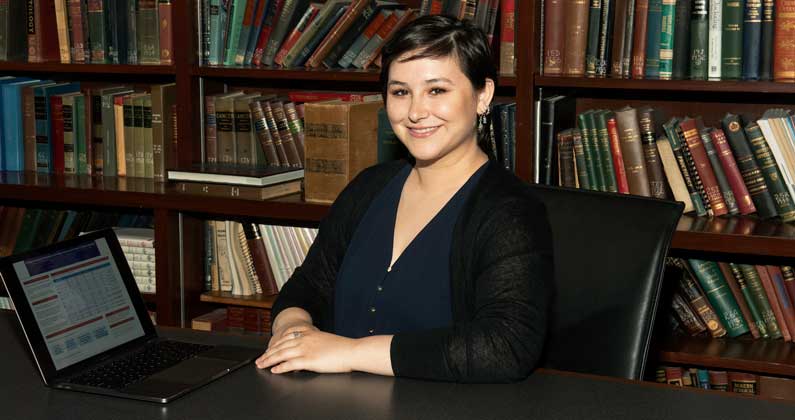Student Research Spotlight
Julia Boyle (PsyD '20)
June 17, 2019 Julie Boyle's (PsyD '20) research investigates insomnia and the daytime symptoms and
health issues following poor sleep.
Julie Boyle's (PsyD '20) research investigates insomnia and the daytime symptoms and
health issues following poor sleep.
Julia T. Boyle (PsyD ’20) is currently studying for her doctorate in clinical psychology at Philadelphia College of Osteopathic Medicine (PCOM). She completed her first practicum training year at PCOM’s Center for Brief Therapy and at the Sleep Disorders Clinic at the Corporal Michael J. Crescenz Veteran Affairs
Medical Center in Philadelphia. Currently, she is completing her practicum at Christiana
Hospital in the Neuroscience consult and liaison service before moving to Boston for
her internship at the VA Boston Healthcare System. She is also a graduate research
intern at University of Pennsylvania’s Behavioral Sleep Medicine Program, and her
research interests include assessment and treatment of insomnia disorder among individuals
with age-related medical and/or neurological disorders including stroke, Parkinson’s
disease and dementias.
What did you study?
My research investigates insomnia and the daytime symptoms following poor sleep. Few
studies have asked whether perception of the severity, frequency and chronicity of
self-reported insomnia changes as people age. Accordingly, my dissertation seeks to
identify the relationship between insomnia, sleep-related daytime dysfunction, problem
endorsement and aging in a large community sample of individuals aged 18-90.
What prompted you to pursue research?
During my undergraduate education in St. Joseph’s University’s (SJU) research-based
psychology program, I began working under the mentorship of Jodi Mindell, PhD, and
quickly developed an interest for sleep research, which continued through my Master’s
degree at SJU when I specifically studied sleep in pediatric and young adult populations.
My intention was to pursue research during my doctoral graduate experience. PCOM’s
emphasis on evidence-based clinical practice, the dissertation process and the College’s
relationships with neighboring universities – such as the University of Pennsylvania
– made this intention a reality. It was at PCOM that I developed an interest in geriatric
populations. I am fortunate my mentor at PCOM, Brad Rosenfield, PsyD, (assistant professor and practicum coordinator, clinical psychology) and my mentor
at University of Pennsylvania (UPenn), Michael Perlis, PhD, both encouraged the growth
of these ideas into what is my current dissertation topic.
What experience do you have conducting research?
Dr. Rosenfield, my dissertation chair, connected me to Dr. Perlis within the Behavioral
Sleep Medicine Program at UPenn, where I have been working as a graduate research
intern since summer of 2016. Dr. Rosenfield is a very supportive mentor and understood
that I had a strong desire to continue behavioral sleep medicine research. He encouraged
me to pursue the opportunity at UPenn and I’m grateful he did. Since I began there,
I have aided in data collection, management and analyses for several studies—including
data several National Institute of Health grants—for the purposes of presentations
and publications. Most recently, two abstracts using my dissertation data have been
accepted for poster presentations at the Associated Professional Sleep Societies (APSS)
Conference in June 2019. The data for my dissertation was collected at sleeplessinphilly.org and
UPenn continues to recruit participants through this method.
What were your responsibilities in this research project?
Through my position at UPenn, I aided in the recruitment and management of data collected
from sleeplessinphilly.com. Along with my principal investigator Dr. Rosenfield and
second dissertation committee member Robert DiTomasso, PhD, dean of the PCOM School of Professional and Applied Psychology, I analyzed and interpreted the data from the online survey for sleep continuity
disturbances (difficulty falling asleep, staying asleep or waking up earlier than
intended), sleep-related daytime dysfunction (concentration difficulties, fatigue
and excessive daytime sleepiness), medical disorders and psychiatric disorders. This
survey also asks whether or not the individual considers their sleep continuity disturbances
or sleep-related daytime dysfunction a problem for them.
What is the broader impact of your research?
Insomnia can lead to increased risk for medical conditions, including cardiovascular
disease, cancer, type-2 diabetes and psychological conditions such as major depressive
disorder and generalized anxiety disorder. I hope that the results of my dissertation
may be used to inform clinicians on how to accurately assess and treat older adults
for sleep disturbances and sleep-related daytime dysfunction. Specifically, this data
may suggest that treatment recommendations should be made on the basis of symptom
severity, frequency and chronicity, even if the patient does not report that insomnia
or daytime dysfunction are a problem for them.
You May Also Like:
About Philadelphia College of Osteopathic Medicine
Established in 1899, Philadelphia College of Osteopathic Medicine (PCOM) has trained
thousands of highly competent, caring physicians, health practitioners and behavioral
scientists who practice a “whole person” approach to care—treating people, not just
symptoms. PCOM, a private, not-for-profit accredited institution of higher education,
operates three campuses (PCOM, PCOM Georgia and PCOM South Georgia) and offers doctoral degrees in clinical psychology, educational psychology, osteopathic
medicine, pharmacy, physical therapy, and school psychology. The college also offers
graduate degrees in applied behavior analysis, applied positive psychology, biomedical
sciences, forensic medicine, medical laboratory science, mental health counseling,
physician assistant studies, and school psychology. PCOM students learn the importance
of health promotion, research, education and service to the community. Through its
community-based Healthcare Centers, PCOM provides care to medically underserved populations.
For more information, visit pcom.edu or call 215-871-6100.
Contact Us
For general media inquiries, please contact the Office of Marketing and Communications
at 215-871-6300 or communications@pcom.edu. Visit our media relations page to view contact information for public relations personnel.
Connect with PCOM

 Julie Boyle's (PsyD '20) research investigates insomnia and the daytime symptoms and
health issues following poor sleep.
Julie Boyle's (PsyD '20) research investigates insomnia and the daytime symptoms and
health issues following poor sleep.